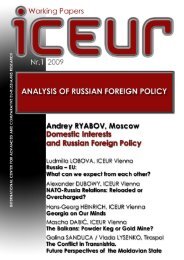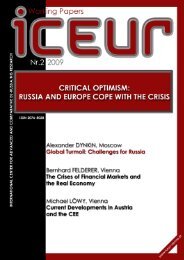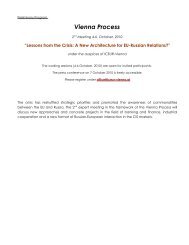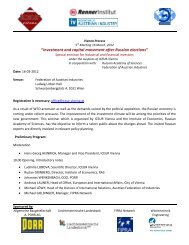EU-Russia: New Departures and Old Habits - ICEUR-Vienna
EU-Russia: New Departures and Old Habits - ICEUR-Vienna
EU-Russia: New Departures and Old Habits - ICEUR-Vienna
Create successful ePaper yourself
Turn your PDF publications into a flip-book with our unique Google optimized e-Paper software.
Mark ENTIN<br />
THE NEW AGENDA<br />
The renewal of relations between <strong>Russia</strong> <strong>and</strong> NATO, <strong>Russia</strong>, the <strong>EU</strong> <strong>and</strong> their member states allows the<br />
partners to think about uncommon new conceptions of cooperation <strong>and</strong> to set up new <strong>and</strong> far-reaching tasks.<br />
Both sides are asked to work on these tasks. The “Partnership for Modernisation” initiative is not that<br />
ambitious. But if it should become a success, it definitely has the potential to provide the partnership<br />
between <strong>Russia</strong>, the <strong>EU</strong> <strong>and</strong> its member states with new quality. It has the potential to pave the future way of<br />
unifying the scientific, innovative <strong>and</strong> economic potential of the continent <strong>and</strong> its legal enforcement.<br />
The idea of the “Partnership for Modernisation” was first proclaimed at the <strong>EU</strong>-<strong>Russia</strong> summit in Stockholm<br />
in November 2009, <strong>and</strong> immediately received constant attention. At the <strong>EU</strong>-<strong>Russia</strong> summit in Rostov-on-<br />
Don on 1 June 2010, <strong>Russia</strong> <strong>and</strong> the <strong>EU</strong> officially started the implementation of the initiative. It was<br />
3<br />
announced officially with a Joint Statement on the “Partnership for Modernisation” at the summit .<br />
The purpose of the initiative is very simple <strong>and</strong> down-to-earth. It aims at making the realisation of the<br />
roadmaps for the development of four common spaces more concrete <strong>and</strong> productive. It has to be focused on<br />
the areas the partners find most important under the given circumstances, <strong>and</strong> show its positive effects as<br />
soon as possible.<br />
If we put the tasks this way, we will have to “pour young wine into old glasses”. Already existing dialogues<br />
on different issues <strong>and</strong> subsidiary <strong>and</strong> more specialised structures of negotiations which have been<br />
established within them will serve as the means for carrying out the initiative. All of them are just being<br />
readjusted according to the selected priority topics <strong>and</strong> projects, <strong>and</strong> all efforts aim at their support <strong>and</strong><br />
realisation. It is only natural that they will be complemented by some kind of superstructure by means of<br />
which the execution <strong>and</strong> stimulation can be surveyed <strong>and</strong> controlled. This superstructure will probably be<br />
consisting of the meetings organised by the sherpas of the initiative.<br />
The most important changes will therefore be the improvement of pace for the joint work – until now, it has<br />
been carried out rather slowly – <strong>and</strong> the different setting of priorities. This is the most important game in<br />
town at the moment. The partners are interpreting priorities in different ways. For Moscow, one of them is<br />
the promoting of innovative activities in those fields of scientific <strong>and</strong> technical progress which it has already<br />
chosen as their future production specialisation, as well as joint research in these areas, activities in joint<br />
ventures <strong>and</strong> the organisation of advanced production. Brussels, on the other h<strong>and</strong>, would rather like to<br />
interpret the concept of modernisation in a broader sense applying to all aspects of the functioning of modern<br />
society.<br />
After reading the Joint Statement, it is quite difficult to name the effects the harmonisation of the two sides<br />
had had so far. Maybe it is still too early. All priorities named in the document are very important. But the<br />
way they are listed reminds of a mechanical conglomerate of very different approaches. Maybe, it will serve<br />
merely as some kind of guidance for the two sides, <strong>and</strong> concrete steps are going to follow in the Plan of<br />
Action on the realisation of the initiative which has been commissioned by the <strong>Russia</strong>n government <strong>and</strong> the<br />
<strong>EU</strong>.<br />
However, Brussels rather saw the Joint Statement as a document to strengthen their position. The proposals<br />
that were h<strong>and</strong>ed over to Moscow already ten days after the summit already contained concrete plans for<br />
every direction <strong>and</strong> reflected the <strong>EU</strong>'s opinion on what has to be done. In the Statement, the following<br />
priorities are named especially:<br />
“- exp<strong>and</strong>ing opportunities for investment in key sectors driving growth <strong>and</strong> innovation, enhancing <strong>and</strong><br />
deepening bilateral trade <strong>and</strong> economic relations, <strong>and</strong> promoting small <strong>and</strong> medium sized enterprises;<br />
- promoting alignment of technical regulations <strong>and</strong> st<strong>and</strong>ards, as well as a high level of enforcement of<br />
intellectual property rights;<br />
- improving transport;<br />
- promoting a sustainable low-carbon economy <strong>and</strong> energy efficiency, as well as international negotiations<br />
on fighting climate change;<br />
3 http://news.kremlin.ru/ref_notes/572/print (2nd June 2010).<br />
IC<strong>EU</strong>R-<strong>Vienna</strong> Working Papers 3|2010 14









